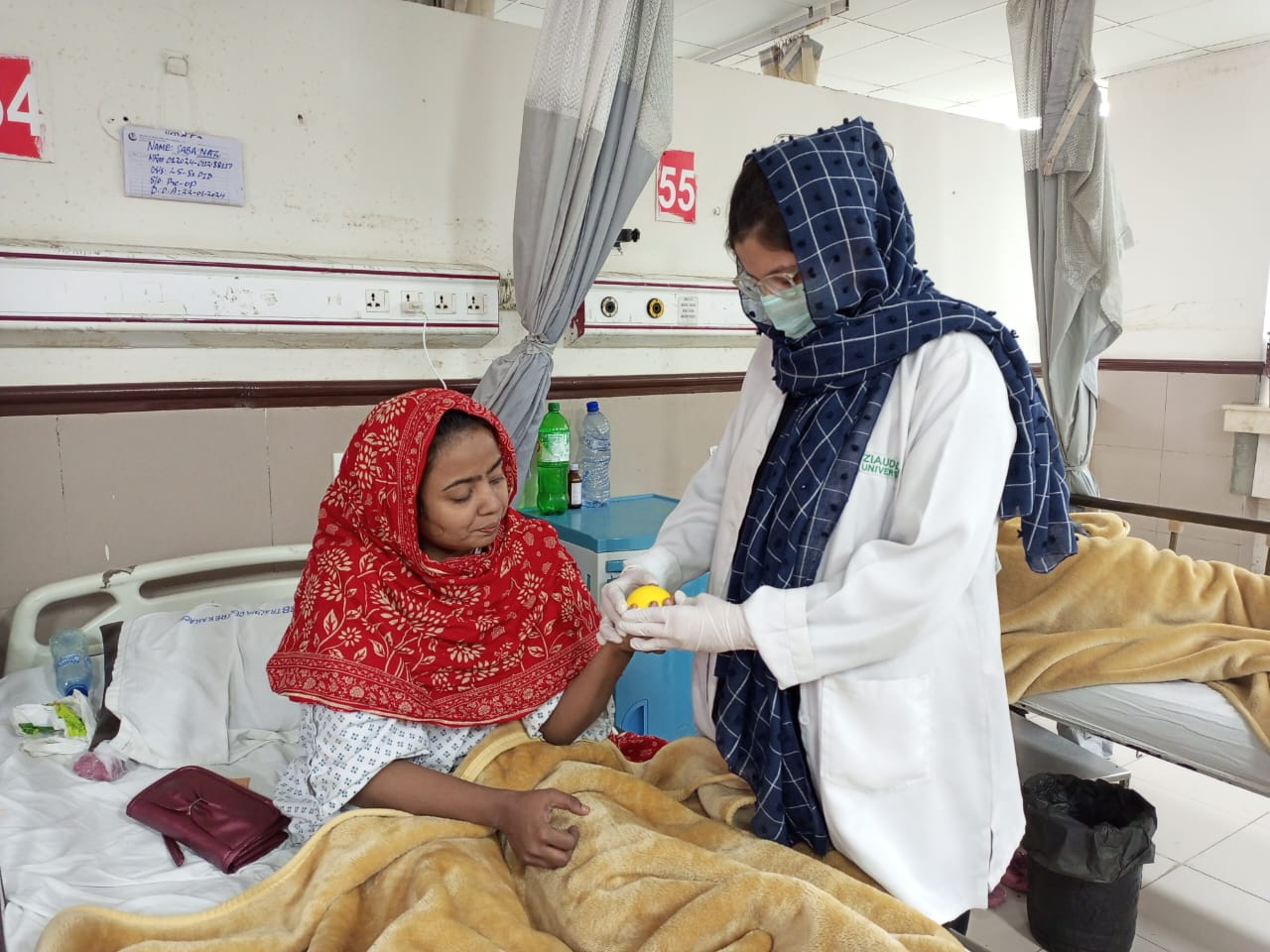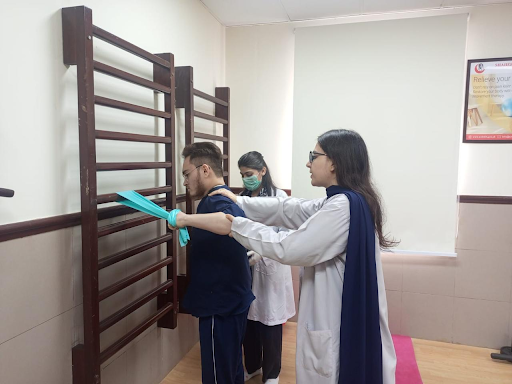The ReLAB-HS Clinical Skills Training programme offered a rare opportunity for a multi-disciplinary group of rehabilitation professionals in Pakistan to observe and train with a leading spinal cord injury (SCI) rehabilitation centre in Peshawar. The experience sparked a movement to improve rehabilitation outcomes in a neighbouring province.
Interdisciplinary practice amongst rehabilitation professionals is still an evolving concept in Pakistan. Rehabilitation professionals rarely work together towards achieving shared patient goals, however there is a growing drive amongst rehabilitation professionals in Pakistan to work towards a more cohesive approach based on the principles of interprofessional collaboration.
In September 2023, 14 rehabilitation professionals from two provinces of Pakistan (Sindh and KP) completed a 3-month comprehensive training programme covering all aspects of SCI management. As part of the programme, participants completed a series of online courses on Physiopedia Plus (Plus), attended online mentoring sessions and engaged in discussions on the Rehabilitation Community Platform.

A key component of the training programme was a 3-day in-person hands on training, hosted by the Paraplegic Centre Peshawar (PCP); known throughout the country for their expertise in SCI management and training. The hands-on training offered a rare opportunity for the participants including occupational therapy (OT), physiotherapy (PT), Prosthetics and Orthotics (PO), Speech and Language Therapy (SLT) and clinical psychologists, to meet face to face, share experiences and differing management approaches with like-minded professionals from a neighbouring province.
Clinical skill training has been an integral part of my continued professional development, offering a bridge between theoretical knowledge and practical application. The hands-on experience gained through this training has been invaluable, enhancing my ability to assess, diagnose, and manage patient care effectively – Nabeela Wali, occupational therapist, Ziauddin University
After experiencing the quality of care and interprofessionalism provided by PCP, Neelum Zehra (occupational therapist, Ziauddin University), together with other motivated training participants from Sindh Province were encouraged to further implement their learning from the clinical skills training programme by seeking ways in which they could improve the rehabilitation services available in their local town of Karachi.
Sindh Trauma centre is one of the largest rehabilitation facilities in Pakistan, providing a wide range of SCI and trauma and physical rehabilitation services including physiotherapy and psychology. However, the centre as yet does not offer occupational therapy or exhibit a culture of interprofessional collaboration.
After a series of planning meetings and discussions led by Neelum Zehra and Nabeela Wali (occupational therapist, Ziauddin University), the rehabilitation staff at Sindh Trauma Centre are set to complete a clinical skills training programme based on the same format pioneered by the Physiopedia team as part of ReLAB-HS activities. The training will form part of a wider plan for continued professional development that aims to strengthen the rehabilitation workforce and lead to improved patient outcomes. The training programme will be carefully tailored to the training needs of the rehabilitation professionals working at the centre, with a strong emphasis on interprofessional collaboration as well as improved patient education and training prior to discharge. A further leap towards strengthening the physical rehabilitation workforce at Sindh Trauma centre is the decision to welcome an occupational therapist as part of their rehabilitation team.

These initiatives will be led by Neelum Zehra with support from fellow rehabilitation professionals from both Sindh and KP Provinces that completed the first clinical skills training programme.
“I am obliged to learn clinical skills from skilled professionals and now transferring learned skills into my students with practical implementation. It has been a transformative journey, shaping me into a more empathetic and skilled healthcare professional.” Nabeela Wali, occupational therapist, Ziauddin University

The movement to improve rehabilitation services is a testament to the value of clinical skills training in empowering rehabilitation professionals to drive positive changes in their workplace and communities alike. Most importantly, the implementation of clinical skills training led by a local team of rehabilitation professionals demonstrates the sustainability of the clinical skills training programme through its ease of replication in any context.
This clinical skills training concept is currently in the process of being developed into a free online tool that will guide others to develop and deliver a clinical skills training programme such as the one completed in Pakistan, in any context, anywhere in the world.
– Thanks to Neelum Zehra and Martina Lukin for summarising the work and preparing this post
This work is supported by the USAID funded Learning Acting Building for Rehabilitation in Health Systems (ReLAB-HS) project and is not possible without the generous and committed contribution of the Leahy War Victims fund.
ReLAB-HS is made possible by the generous support of the American people through the United States Agency for International Development (USAID) and is implemented under cooperative agreement number 7200AA20CA00033. The consortium is managed by prime recipient, Johns Hopkins Bloomberg School of Public Health.

